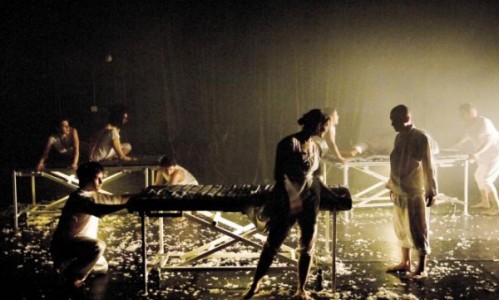Theatre-Making in the 21st Century – Duška Radosavljević on the changing face on contemporary theatre-making.
1. Education and Training – It is symptomatic that artists who declare themselves as ‘theatre-makers’ have mostly emerged out of universities rather than drama schools. (I base this distinction on an observation made by Lyn Gardner). Their artistic ambitions are inter-disciplinary and their understanding of theatre is performance- rather than literature-oriented. In addition, growing class-sizes in British universities cultivate group-work and collaboration rather than individual artistic development. (University drama degrees are similarly responsible for the changing face of theatre criticism today.)
2. Self-Determination – In contemporary theatre-making, the division of labour is no longer organized around economic and professional allegiance to a particular trade, guild or confraternity but emerges out of the individual artist’s determination, personal interests, aptitudes, skills and creative concerns. Theatre-makers, in various cultural contexts, more often emerge within subsidized rather than commercial sectors.
3. Deprofessionalisation – This term is used not to imply that theatre-making is ‘unprofessional’ but to acknowledge the unwillingness or inability of contemporary theatre-makers to occupy only one definition of the existing professional profiles of actor, writer, director, designer, composer, choreographer. Very often, a theatre-maker takes on more than one of these roles in an integrated way.
4. Collaboration – ‘Devising’ is only one possible manifestation of collaborative ways of working in theatre. Once a basis for a text-performance binary, devising is now a largely historical category, which had emerged within a very specific cultural context at a particular moment in time (Great Britain in the 1960s). Whether or not it is ‘text-based’, theatre-making in principle is collaborative – even if it results in a one-person performance.
5. Globalised Workplace – Despite the fact that contemporary theatre-makers are increasingly working in a globalised workplace, they nevertheless emerge within very specific cultural contexts, therefore inheriting specific and sometimes conflicting epistemic, ethical and economic legacies (this is particularly acute in the persisting East /West binary decades after the end of the Cold War). Different cultures appear to have different conceptions of text and performance (and of their relative value) in theatre-making processes.
6. Acting as Authorship – Actors are increasingly, once again, recognized as having the potential to act as authors in the medium of theatre (having lost their authority with the advent of the published playwright in the 19th century).
7. Performance-Oriented Writing – Playwriting is no longer conceived of as necessarily a literary activity but also a kinaesthetic, designerly and/or musical one, in the 21st century the performance script is increasingly an unstable entity, a structure deliberately open to and contingent on the audience input, rather than serving as a set blueprint for performance.
8. Empowered Directing – When present in the process of theatre-making, directors are increasingly recognized as having the courage to be equal members of an ensemble, rather than aiming to be cult figures.
9. Audience Activation – Contemporary theatre-makers are challenging the heritage of the late 19th and 20th century theatre conventions such as the ‘fourth wall’, passive audience appreciation, and the notion of a theatre critic as an arbiter between the text and performance by actively involving the audience in the live process of theatre-making. (This raises exciting ethical and economic questions for discussion.)
10. Refocusing Authority – In the context of theatre-making the prevailing interest is in the notion of authority as a property of authorship, rather than a term implying a hierarchical position of power. (For how else can authority be apportioned in the case of truly collaborative meaning-making?)
A theoretical context and a discussion of relevant examples and case studies of theatre-making – ‘a deprofessionalized, collaborative activity that takes an active and integrated intellectual and embodied approach to the notion of theatre authorship (whether or not it is based on text)’ – are provided in the book Theatre-Making: An Interplay Between Text and Performance in the 21st Century by Duška Radosavljević
This article was kindly re-published with the permission of Exeunt Magazine where it first appeared on 11 February 2015 – for more information go to www.exeuntmagazine.com


